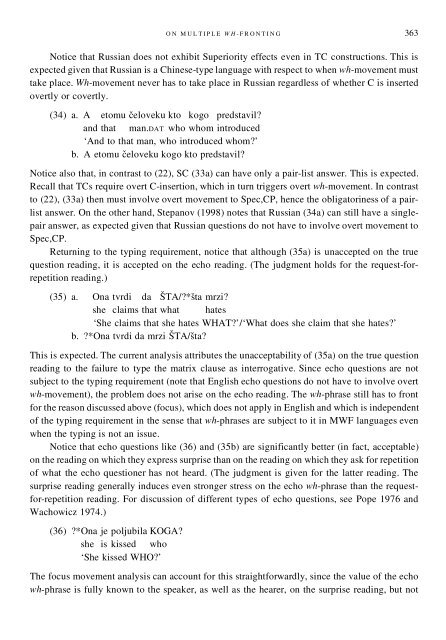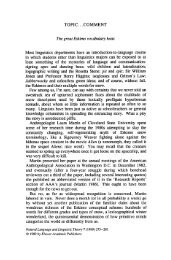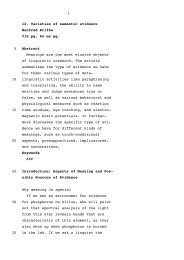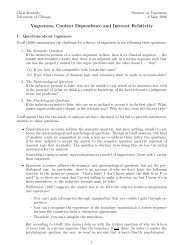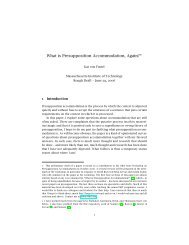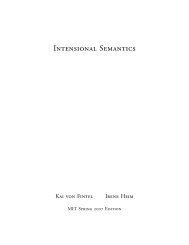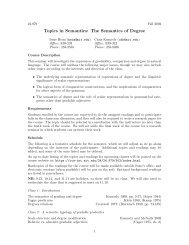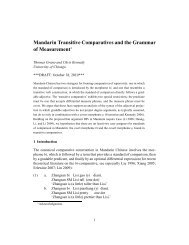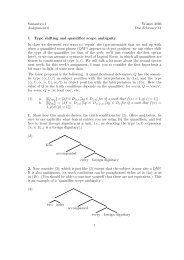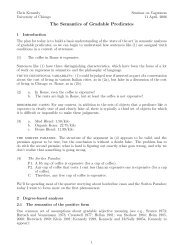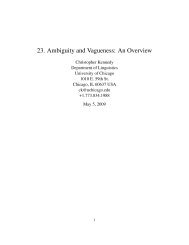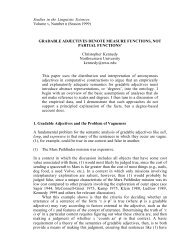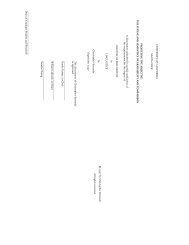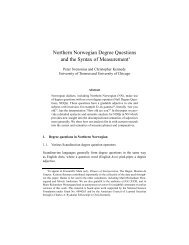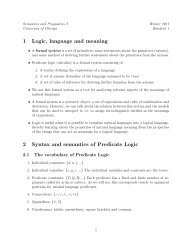362 ZÏ E L J K O B O SÏ K O V I Ćinterrogative either through a question particle or by fronting a wh-phrase. Since SC does not havea question particle in the relevant constructions, one wh-phrase must front for typing purposes. Iassume the typing is carried out by fronting and pronouncing a wh-phrase within the highestphonologically realized projection in overt syntax. 1 7 In D-linking questions this can be donethrough either scrambling or wh-movement. (Given that SC patterns with French with respect towhen overt wh-movement takes place, wh-movement should be an option even in short-distancematrix questions like (6a) since in French wh-movement takes place optionally in such questions.Recall that overt wh-movement cannot have taken place in the grammatical derivation <strong>of</strong> (6b)because <strong>of</strong> Superiority.) I assume that when wh-phrases in questions like (6) (or Russian (12))are not D-linked, the typing can be carried out within the focus-licensing projection, which canbe the highest projection given that, as argued in BosÏ ković 1997c, 2000, CP does not have to beinserted until LF in (6). I argue that [`wh] C in questions like (6a) can be inserted either overtlyor covertly. If it is inserted covertly, no overt wh-movement takes place. If it is inserted overtly,wh-movement takes place overtly. (I show that in structures where the wh-movement option isforced, LF C-insertion is blocked.) 1 8 <strong>On</strong>e argument for the analysis not noted in the works citedabove concerns topic constituents (TC) (see Stjepanović 1999a,b for another argument based onsluicing). With TCs, SC shows Superiority effects even in short-distance null-C questions.(33) a. Tom cÏ oveku, ko je sÏ ta poklonio?that man.DAT who is what bestowed‘<strong>On</strong> that man, who bestowed what?’b. ??Tom cÏ oveku, sÏ ta je ko poklonio?Rudin (1993) discusses TCs in Bulgarian and argues that TCs are adjoined to CP. 1 9 TCs can thenbe present in the structure only when CP is present overtly. Overt insertion <strong>of</strong> a [`wh] C inducesa Superiority effect, which means that it forces wh-movement. It follows then that in (6b), whichdoes not show Superiority effects and therefore does not involve overt wh-movement, CP is notinserted overtly.17 I am departing from Cheng’s proposal in the technical aspect <strong>of</strong> the typing analysis, maintaining its spirit.18 In BosÏ ković 1998a, 2000, I apply the LF C-insertion analysis to French. LF C-insertion results in wh-in-situ—thatis, lack <strong>of</strong> overt wh-movement—in French. As in SC, overt C-insertion triggers overt wh-movement. (This is whereFrench differs from Chinese. In Chinese no wh-movement needs to take place overtly even when C is inserted overtly.More formally, the [`wh] feature <strong>of</strong> C is weak in Chinese and strong in French. French allows wh-in-situ because Ccan in certain contexts be inserted in LF, which is a possibility under Chomsky’s (1995:chap. 4) definition <strong>of</strong> strength.)19 They precede wh-phrases located in Spec,CP. Note that (33) can contain a wh-phrase in the highest phrase so thatclausal typing is not a problem. TCs are, however, <strong>of</strong>ten treated as extrasentential and ignored for clause-internal requirements.Thus, Ćavar and Wilder (1999) and Schütze (1994), who adjoin TCs to CP, treat TCs as extrasentential (i.e., asnot belonging to the same clause as elements dominated by CP) for the purpose <strong>of</strong> clitic placement. It is then possiblethat the presence <strong>of</strong> a TC—which is not dominated by CP, hence can be said not to make the CP phonologicallyrealized—does not force clausal typing within CP in (33). <strong>Wh</strong>-movement still must take place in (33) for reasons givenabove. Note that even if we assume that TCs are located in the Spec <strong>of</strong> a head taking CP as complement, as in Tomić1996, wh-movement will still be forced in (33). Under this analysis it is also natural to ignore the projection hosting TCsfor clausal typing purposes. Since according to Tomić the projection hosts only elements denoting old information, whphrasescan never move to it; that is, they always remain below it. Under this analysis we can assume that clausal typingtakes place up to CP—in other words, that CP closes its domain. I assume that for one <strong>of</strong> the above reasons, TCs donot affect clausal typing.
O N M U L T I P L E W H - F R O N T I N G 363Notice that Russian does not exhibit Superiority effects even in TC constructions. This isexpected given that Russian is a Chinese-type language with respect to when wh-movement musttake place. <strong>Wh</strong>-movement never has to take place in Russian regardless <strong>of</strong> whether C is insertedovertly or covertly.(34) a. A etomu cÏ eloveku kto kogo predstavil?and that man.DAT who whom introduced‘And to that man, who introduced whom?’b. A etomu cÏ eloveku kogo kto predstavil?Notice also that, in contrast to (22), SC (33a) can have only a pair-list answer. This is expected.Recall that TCs require overt C-insertion, which in turn triggers overt wh-movement. In contrastto (22), (33a) then must involve overt movement to Spec,CP, hence the obligatoriness <strong>of</strong> a pairlistanswer. <strong>On</strong> the other hand, Stepanov (1998) notes that Russian (34a) can still have a singlepairanswer, as expected given that Russian questions do not have to involve overt movement toSpec,CP.Returning to the typing requirement, notice that although (35a) is unaccepted on the truequestion reading, it is accepted on the echo reading. (The judgment holds for the request-forrepetitionreading.)(35) a. <strong>On</strong>a tvrdi da SÏ TA/?*sÏ ta mrzi?she claims that what hates‘She claims that she hates WHAT?’/‘<strong>Wh</strong>at does she claim that she hates?’b. ?*<strong>On</strong>a tvrdi da mrzi SÏ TA/sÏ ta?This is expected. The current analysis attributes the unacceptability <strong>of</strong> (35a) on the true questionreading to the failure to type the matrix clause as interrogative. Since echo questions are notsubject to the typing requirement (note that English echo questions do not have to involve overtwh-movement), the problem does not arise on the echo reading. The wh-phrase still has to frontfor the reason discussed above (focus), which does not apply in English and which is independent<strong>of</strong> the typing requirement in the sense that wh-phrases are subject to it in MWF languages evenwhen the typing is not an issue.Notice that echo questions like (36) and (35b) are significantly better (in fact, acceptable)on the reading on which they express surprise than on the reading on which they ask for repetition<strong>of</strong> what the echo questioner has not heard. (The judgment is given for the latter reading. Thesurprise reading generally induces even stronger stress on the echo wh-phrase than the requestfor-repetitionreading. For discussion <strong>of</strong> different types <strong>of</strong> echo questions, see Pope 1976 andWachowicz 1974.)(36) ?*<strong>On</strong>a je poljubila KOGA?she is kissed who‘She kissed WHO?’The focus movement analysis can account for this straightforwardly, since the value <strong>of</strong> the echowh-phrase is fully known to the speaker, as well as the hearer, on the surprise reading, but not


